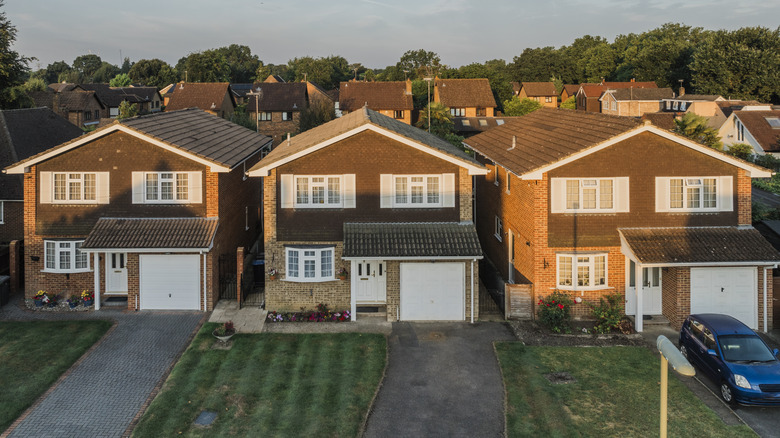The Best Way To Invest In Real Estate Without Buying A Home
You can still invest in real estate without buying a house in an expensive city by using a technique known as rentvesting. This means that you keep renting in the neighborhood you love, and instead use your savings to purchase a rental property in a more affordable part of the city, or a different city altogether, in which tenants cover your mortgage obligations. For example, say you're renting in Los Angeles for $2,874 a month — the average rent as of June 2025, per Zillow – but buying a home would cost roughly $970,592. Instead of trying to afford an L.A. mortgage, you buy a rental home in Cleveland, Ohio. Since a typical house in Cleveland is $116,771 according to Zillow, placing a 15% down payment of $17,515 would leave you with just $99,256 to finance with a 30-year loan at a fixed rate of 6.74%, which gives a monthly mortgage payment of $643. This 6.74% rate is not guaranteed, however, especially if you have a low credit score.
With the average rent at $1,394 in Cleveland, via Zillow, you'd likely spend $139 for property management, based on the roughly 10% rate that many Cleveland managers will request on the $1,394 rent. Then, you must pay property tax of $128, using Ohio's July 2025 effective rate of 1.31% according to Kiplinger. After this is landlord insurance which adds $79 monthly, and another $139 (10% of rent) for repairs. Altogether, monthly expenses reach $1,128. That leaves a cash flow of roughly $266 per month, or more than $3,100 per year, as your tenant steadily pays down your loan while you build equity.
Scale smart using 1031 swaps
Once your first rental is doing well, a 1031 exchange can let you swap it for a bigger property without paying capital gains tax upfront. According to the IRS, you have 45 days after selling to pick your next place, and 180 days to close the deal. You will need to report this on Form 8824. Let's say you sell your Cleveland rental for $150,000 and walk away with $50,000 in equity. To avoid paying capital gains tax right away, you'd need to reinvest the full $150,000, equity, and the loan you paid off, into new properties. If the full sale amount goes into the next purchase, and you take on at least the same amount of debt, the IRS lets you defer taxes using a 1031 exchange.
If you want to buy another rental, you may need a Debt Service Coverage Ratio (DSCR) loan. Instead of checking your personal income, this loan focuses on the rental property. The key metric is a 1.25 DSCR, which means the expected rent should be at least 25% more than the monthly mortgage, which means if your mortgage is $1,000, the property should bring in at least $1,250 in net rent. At today's average 30-year fixed rate of 6.74%, that margin can get tight. So, always run the numbers again with a slightly higher rate, like 7.24%, just to be safe. If the deal doesn't clear the 1.25 mark, increase your down payment or look for a cheaper property.
Watch vacancy and tenant rules
Vacancy rates and local laws matter just as much as the rent you collect. A good market will keep your property occupied. July 2025 U.S. Census Bureau data shows that 7% of U.S. rentals were empty in the second quarter of 2025, so anything lower than that in your target city is a good sign. Still, strong demand won't protect your income if local rules cut into your profits. In Oregon, for instance, landlords can only raise rent once a year, and the hike has to stay under 10% or 7% plus inflation, whichever is less. In Minneapolis, you now have to give tenants 30 days' written notice before filing a non-payment eviction, even if rent is late. That can drag out turnover, and delay your next check.
Taxes can also eat into your rental profits, unless you understand the passive-loss rule. If you're involved in managing a property, such as setting rent or approving repairs, the IRS lets you deduct up to $25,000 of rental losses from your regular income. There's a catch, however — once your adjusted gross income goes over $100,000, that deduction starts shrinking by 50 cents for every extra dollar. When you hit $150,000, the tax break is gone completely. That's why you should plan ahead. If you're selling a property, or cashing out a big refinance, time it so your income doesn't accidentally knock you out of the deduction. Consult a financial advisor to find more tax deductions or to help you save money on rentinvesting.


